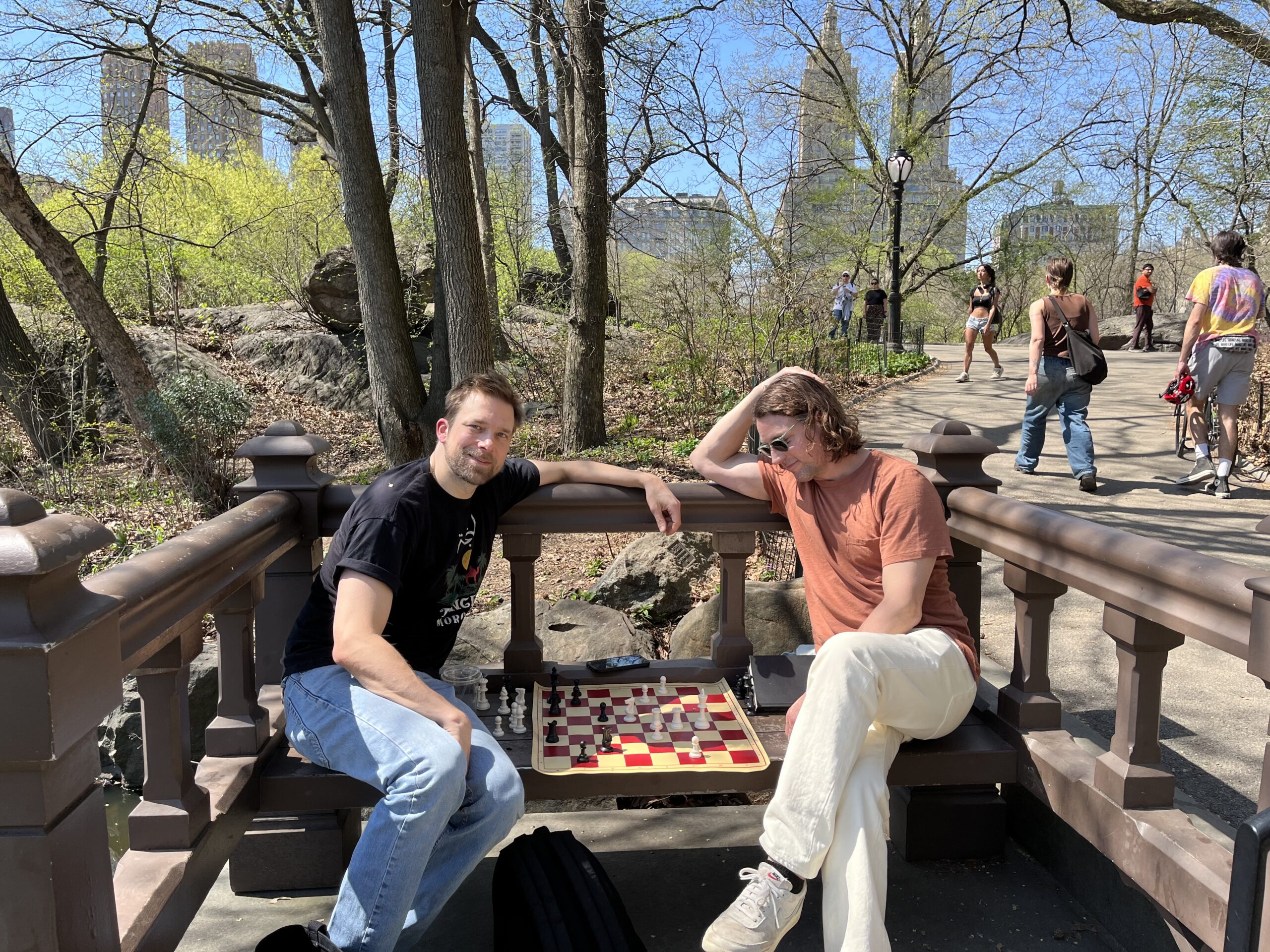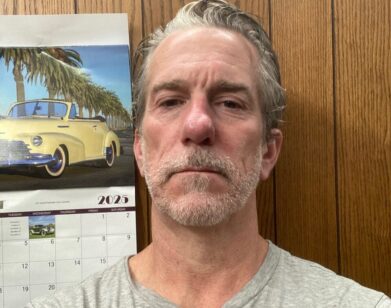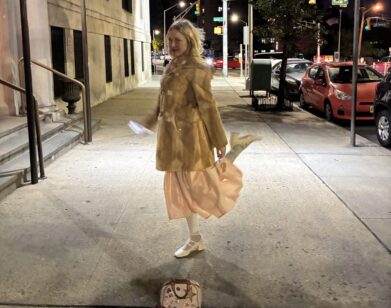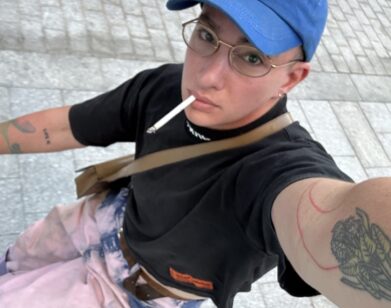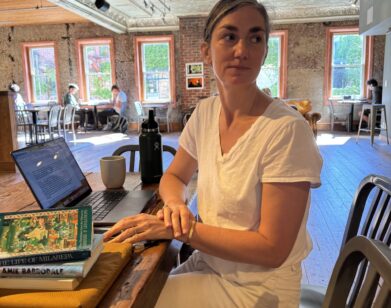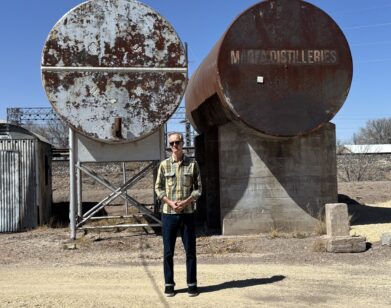BOOKS
Christopher Bollen and Will Chancellor Talk Fate and Fiction Over Chess
The first thing to catch my attention in Christopher Bollen’s fiction was his tremendous, Wildean ability to capture an entire character in fewer than ten words. This skill has served him well in keeping a murder mystery’s cast of characters both vivid and memorable. A second quality has emerged and deepened in his past two novels: a masterful sense of place. With A Beautiful Crime, Bollen gave us indelible Venice. Here, in 2023’s The Lost Americans, Bollen evokes the thrum and blur of Cairo.
City and character intersect when arms-expert Eric Castle stations in Cairo as a missile tech. After his body is found in a back alley outside a hotel and the authorities rule the death a suicide, his sister Cate relentlessly seeks the truth. Moving with the naive boldness of a tourist, she repeatedly skirts life-threatening situations. Cate affords us a view of the Egypt we expect, but a closeted young man named Omar, the novel’s emotional protagonist, shows us a more nuanced view of the country’s turbulence and its beauty.
Christopher Bollen and I met in Central Park on an absolute stunner of an April day. We played many games of chess and took many, many pictures for tourists posing in front of Bow Bridge—Christopher is generous like that.
———
CHRISTOPHER BOLLEN: This is our second time playing chess together, right?
WILL CHANCELLOR: True. The first time you won all three games.
BOLLEN: No, you won one.
CHANCELLOR: I think you might have thrown one.
BOLLEN: It was on the chess board I got in Paris from the flea market. You broke it in.
CHANCELLOR: Nice. Now, before I make my opening in chess, I’m going to do my interview opening.
BOLLEN: Okay.
CHANCELLOR: Something that I hadn’t noticed until this new book, The Lost Americans, was how much of your version of mystery and suspense and thrillers trades on the idea of intuition askew, on some kind of mis-intuition.
BOLLEN: Oh, right.
CHANCELLOR: And the idea that you can’t necessarily trust intuition. Now, you and I are similar in the sense that we are intuitive chess players. Neither one of us knows anything about how the game should be played.
BOLLEN: Nothing at all.
CHANCELLOR: So I’m curious about the role of intuition in your life and the role of intuition in your fiction.
BOLLEN: I will say I do more research for writing than for chess. Should we write down our moves?
CHANCELLOR: “He begins with a gambit.” I have a feeling that our interview will be severely hampered by—
BOLLEN: Wait, did I already fuck up?
CHANCELLOR: —chess playing.
BOLLEN: I already fucked up.
CHANCELLOR: I don’t think you did. What you’re trying to do is a dirty trick. You’re trying to sack your bishop here and win my queen.
BOLLEN: Exactly. But regarding intuition, my friend Adam taught me how to play. I have no innate skill at chess. That’s for damn sure. But as for the novels, I do a lot of research ahead of time. Then, I go to the place. Once I travel there and get a feeling for it, it becomes very intuitive. At that point, I know that it’s a place that is complicated and vast enough to hold an interesting book, and my attention.
CHANCELLOR: I’m specifically interested in the way that we judge character and the way that we think that we know the good guys and the bad guys.
BOLLEN: That is something I’m obsessed with.
CHANCELLOR: There’s a high probability in your fiction that if someone appears to be a good person, that character is not a good person.
BOLLEN: That’s probably true. If you read enough Agatha Christie, you can always figure out who the killer is.
CHANCELLOR: Do you have a sense that you’re a good judge of character?
BOLLEN: Yes and no. I’m a really good judge of character in friendships. I would say I’m a terrible judge of character in romantic relationships.
CHANCELLOR: I feel the same way.
BOLLEN: Check.
CHANCELLOR: Where’s the check?
BOLLEN: Oh, shit. That’s not check. Thank god this tape recorder can’t see what terrible moves I’m making. I was always a reluctant mystery writer. But for [The Lost Americans], because I wrote it during the pandemic, I thought I’d just go whole hog into the genre and play with it a little bit. I made it a little bit faster, less stuck on visuals.
CHANCELLOR: What do you mean by that?
BOLLEN: I love beauty, and I love art, and I love describing scenes.
CHANCELLOR: Why do you say “stuck on visuals”? That’s the point, right? To vividly render what you see in your head?
BOLLEN: I gorge myself on the beauty of places and people.
CHANCELLOR: And what’s wrong with that?
BOLLEN: Nothing. It’s my favorite thing to do and my favorite thing to read, and I’m a hopeless romantic about it. But this one, I wanted to be a bit more fleet-footed, and for the novel to not just be about these realms of beauty and art. Egypt is amazing, but it’s a more difficult setting. It’s harder to be apolitical.
CHANCELLOR: Irresponsible, even.
BOLLEN: Yes. I knew I wanted a gay character, a gay Egyptian, and it would’ve been not only ignorant not to write about what’s happening with the gay community there, but it would’ve been dangerous. It is so hard to do this interview while playing chess.
CHANCELLOR: Yeah. This is the only part of the interview that’s going to involve us playing chess.
BOLLEN: Oh, why? I’m enjoying it.
CHANCELLOR: So there’s an unfortunate, timeless quality to talking about arms sales in the Middle East. There’s no real reason why, from that perspective, this novel needed to occur in 2020, 2023, or whenever exactly.
BOLLEN: It’s pre-pandemic in my mind. Probably three years after Sisi snatched power away from Morsi.
CHANCELLOR: That puts us in 2017, right? Did you have any moment where you were thinking, “It’d be a lot easier if I just set this in the ’90s?” What drew you to a more modern setting?
BOLLEN: It’s easier to talk about a time you know, rather than having to think historically. I didn’t go to Egypt in the ’90s, so I don’t know it. Of course, it’s always nice to not have to deal with cell phones and the internet and all of that. It’s hard to make something sound compelling and physical in your book when it involves digital information. And kudos to writers who can do that.
CHANCELLOR: You went there during the Mubarak era, right?
BOLLEN: Yes, 2010. The year before the Arab Spring, and that was my first visit.
CHANCELLOR: What drew you to setting The Lost Americans on the other side of the Arab Spring?
BOLLEN: Well, it’s a timeless story. Cate is someone who’s aged out of New York. She’s at a crossroads moment in her life where she can’t be a wild child anymore. And now she’s trying to figure out what her next act is. I’m 10 years older than she is, but I can still relate to that. That feeling of outgrowing this self that ran amuck in New York. And it just seemed like such a full life. And then suddenly finding that no longer yours. I set it in the present because that’s how I was feeling about New York in the present.
CHANCELLOR: It interests me that New York was the time driver—that it was ultimately a character who dictated the time the novel’s set.
BOLLEN: It would’ve been a very different thing to write about a gay Egyptian character in the ’90s. It might have been more free. But in writing this book, I was trying to understand the questions of identity and homosexuality in my time.
CHANCELLOR: It’s changed so much in your life.
BOLLEN: Oh my god. Radically.
CHANCELLOR: That was a good move. You kept me from doing my thing.
BOLLEN: I know. My sole interest was to thwart you. I certainly feel like I was seeing what was going on with Sisi and the gay community in Egypt, and looking on in horror. Just thinking of Sarah Hegazi—
CHANCELLOR: You mentioned her in your acknowledgments.
BOLLEN: —in 2017. Yes. She was an Egyptian lesbian activist who had the audacity to wave a rainbow flag at a concert. And because someone took a picture, she was arrested, tortured, and imprisoned. And eventually, she went into exile in Canada where she killed herself. Which is indicative of what’s happening. The fear for that community drove me crazy. And maybe I’m not the right person to tell her story, but I was moved by it. I was moved by a jumble of things.
CHANCELLOR: And I feel you handled that responsibly in the book.
BOLLEN: Thanks. Hey, where’s my castle? Oh, here it is.
CHANCELLOR: You found it. Now, talk to me about the notion of reveal in mystery. If the reveal is artificial, the whole thing falls apart, it needs to have this concept of inevitability to it.
BOLLEN: I didn’t come up with this. It’s the idea that you’re supposed to be surprised, but believe that it could have been no one else all along. Famously, Agatha Christie says she didn’t know the answers to the riddles until the end. She would get two-thirds through and then look at her notes and figure out who the least likely suspect would be, and tailor it to that. I’m envious of writers who don’t feel any need to solve any mysteries, because it’s so difficult. I’m required by some twist of fate to also solve a mystery; I could never leave it unsolved.
CHANCELLOR: I’ve read your work and have always seen a real gift for character. You’re able to sum up an entire character with a pithy phrase like, “He’s the kind of guy who owned violent dogs.” We have a full trajectory of the character based on that, it’s all we need to know. This book seems like your best effort at putting place on the same pedestal as character.
BOLLEN: Totally. The last book [A Beautiful Crime] was also place-heavy, in that Venice was the main character. And if you go to Venice, it overwhelms everything you do. You have to negotiate with the place because it’s so peculiar. Egypt, in a very different way, is like that as well.
CHANCELLOR: This book had much more attention to sound as a way to capture place than I noticed in any of your other books.
BOLLEN: I’m so glad you said that. I’m visually obsessive as a writer, so I’m glad you took notice of the sound as well.
CHANCELLOR: It’s everywhere, you have a piano tuner. Omar, the boyfriend, has a hearing aid…
BOLLEN: I was trying to think of a sensory experience in writing that wasn’t so visual. How amazing would it be if you just write a whole book about smells? I couldn’t do it, probably because of my years of smoking cigarettes. But a lot of my smell has come back. I liked forcing myself to write with a different frequency in mind. I’m glad that came across.
CHANCELLOR: You talked about the tactility of Cairo as well, and that’s here. This is what gives the novel its immediate sense of place, touch and sound replacing sight as the novel’s primary driver.
BOLLEN: The way I experience New York is very similar to the way I experience Cairo. Well, New York is always in danger of being Disneyfied, but it’s one of those cities in the world where you feel it all. You smell it, you taste it. That full-body immersion is what attracts me.
CHANCELLOR: The first moment, the first five minutes that you’re in a country, it’s this balance of disorientation and taking in new information, but also trying to enter the flow.
BOLLEN: It’s so overwhelming, especially when you go on an overnight flight and you’re exhausted. But then you just have to adjust to a different pace. As I get older, it’s even harder. We’re taught to look towards these banisters of life—airports, hotels, security guards—and lean on them for safety. But those are the most fun ones to play with and dismantle or loosen as a writer.
CHANCELLOR: Especially traveling abroad in something as foreign as the arms trade.
BOLLEN: That was foreign for me too. What made it exciting is that I was learning as Cate was learning.
CHANCELLOR: I’m curious about how dark that world is. I would think that it has the capacity to be infinitely dark.
BOLLEN: It’s extremely dark. I did a lot of research. I wrote this over COVID, in Massachusetts. Luckily I knew someone who was connected to the arms trade, just tangentially.
CHANCELLOR: Really?
BOLLEN: He was a “scholar of war.”
CHANCELLOR: That’s probably better than the alternative.
BOLLEN: Well, he referred me to people who were experts in arms. I was talking to one, I’ll never forget it. He said that, after the drug cartel, the private arms trade is the most dangerous business on the planet. It isn’t complete fiction. When you’re writing these things, you have to be like, “Why is someone killing someone else over a teacup?” That alone doesn’t make any sense.
CHANCELLOR: I’m amazed at how low the price of human life is.
BOLLEN: That’s a great way of saying it. And there’s a part of me in this book where it would’ve made more sense from a pure thriller aspect to just start it in Cairo. In a classic mystery, Cate should come to Cairo right in the next scene after her brother’s death.
CHANCELLOR: But she takes brave leaps at several turns, and those are the kind of things that could leave you scratching your head. In this case, every time that she did something outlandish—like going into the desert to watch a missile test—it made total sense in the context. That comes from her character being so well drawn. No question.
BOLLEN: Thank you.
CHANCELLOR: Just a little praise.
BOLLEN: Thank you. It’s hard to know if you’re making your character do impossible things. But she’s not a private investigator, which cures a lot of those questions. I just want to say it’s such a pretty day in New York.
CHANCELLOR: Yeah. This is a keeper.
BOLLEN: Do you think that you could write the way that you write anywhere? Or has New York helped you?
CHANCELLOR: New York has hindered me tremendously.
BOLLEN: It’s hindered you? New York is my favorite subject really at the end of the day.
CHANCELLOR: It’s a tremendous hindrance. Everything about this place is impossible. I’m viewing my time in New York as a chance to meet great people and start great lifelong conversations. But as far as the logistics of living and writing in the city, they couldn’t be worse.
BOLLEN: Tell me specifically why they’re so detrimental.
CHANCELLOR: First, it’s expensive. It causes you to work your day job longer than you would like to.
BOLLEN: True.
CHANCELLOR: Second, the infinite amount of possibility is impossible to ignore. There’s always someone and somewhere that you’re getting pulled in one direction or another. Third, the reactionary tendency to want to withdraw into hermitage. You feel guilty and want to be a hermit. But then when you’re a hermit, you don’t feel quite comfortable either.
BOLLEN: It seems we’ve both entered a certain hermetic stage.
CHANCELLOR: Right.
BOLLEN: You have a nice apartment, but it’s too small of a space in New York to stay holed up for an infinite amount of time, which I do. I have an amazing ability to stay in one room for a very long time. New York trained me for the pandemic in a way.
CHANCELLOR: This city is just brutal for romantic, nostalgic people who like look back at something. You have to remind yourself to always be looking forward instead of at the places that close down, because everywhere is constantly closing down.
BOLLEN: We’ve already complained about the towers on the south side of the park today.
CHANCELLOR: I don’t feel like I’m a New York writer. From [Lightning People] to present, you are a thoroughly New York writer who feels the energy and can capture it.
BOLLEN: Well, I went to college here and my adult identity is so wrapped up in New York. In my twenties, until my mid-thirties, I did New York to its best. And now I just want to pet this dog with booties on.
CHANCELLOR: Do you think this is setting you up for a different trajectory in your life, writing or otherwise?
BOLLEN: New York is so kind to always take people back. So in that way, it’s not so brutal because for a time I did think, “Fuck New York. I’m going to live in the Berkshires. I don’t need this anymore.” And look at me now. The Berkshires are gone. But I still have New York.
CHANCELLOR: That’s true.
BOLLEN: I love to be a stranger in a strange land. In New York, you’re always a bit of a stranger in a strange land. New York is an annex of the foreign.
CHANCELLOR: Give me three cities that have novel potential for you right now.
BOLLEN: Places I’ve been, or places I haven’t been?
CHANCELLOR: I’m going to leave that up to you.
BOLLEN: Oh, I love this game. I would like to write a novel set in Rio.
CHANCELLOR: Ooh.
BOLLEN: I’m very curious about Santiago, which I know is a bit slower than Rio.
CHANCELLOR: They call it “slow Rio.”
BOLLEN: Do they?
CHANCELLOR: No.
BOLLEN: [Laughs] But I haven’t been to Santiago, so I don’t know. But I’m very curious to go. I’d like to write a Rome novel or a Southern Italy novel.
CHANCELLOR: I would like to read your Rome novel.
BOLLEN: I would do that very well. Italy’s my favorite.
CHANCELLOR: And you’re fluent in Italian.
BOLLEN: I just started taking Italian lessons again.
CHANCELLOR: “Again.” For the eighth time.
CHANCELLOR: Let’s get your third.
BOLLEN: I’ve always wanted to go to Nairobi. I have never been there, so that’s going to be the one that I’ve never been to that I’d like to write.
CHANCELLOR: Print it.
BOLLEN: I’m only writing nine novels, you know?
CHANCELLOR: Why is that?
BOLLEN: I was in Newport for work and—
CHANCELLOR: Newport, California, or Newport, Rhode Island?
BOLLEN: Newport, Rhode Island. And I was staying at the hotel. They were like, “You have to talk to Basil. She’s a tarot card reader. She’s amazing.” I’m not really into that, but he said she’s a legend, so I reluctantly went. She was amazing and super nice on top of it. And I got great cards.
CHANCELLOR: She had great cards, or you got great cards?
BOLLEN: She dealt great cards for me. Mostly hopeful and positive. But from what I understood, she said, “You will write nine novels and you’ll attempt to write a 10th one. Something will happen to direct you in another way.” I could die. Or I could become a screenplay writer.
CHANCELLOR: Exactly.
BOLLEN: Or I just give up.
CHANCELLOR: That too.
BOLLEN: Okay, one more game of chess. Are you hungry?

